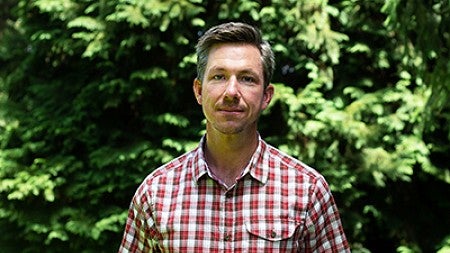
Earth Sciences
jroering@uoregon.edu | 541-346-5574
Courses: Earth Surface and Environment (Geol 202), Earth and Environmental Data Analysis (GEOL 418), and Hillslope Geomorphology (GEOL, 441)
In my classes you will:
- Practice foundational, transferrable skills.
- Develop a significant project that will challenge you and make you proud.
I was invited into the Teaching Academy because:
- I am an Ersted Award Recipient.
In what ways are you working to make your teaching inclusive?
I try to get students invested from the beginning and to instill a community-oriented learning environment. I always give students an opportunity to express their motivation for taking the class on the first day (in writing or aloud) and the outcome is often surprising, but also helpful. As an instructor, we often overestimate how much students know about a particular discipline or field of study. Rather than define a field or topic at the beginning of class using definitions, I prefer to do so with examples and current events. Doing this connects with students’ existing understanding of the world and we can continue to build knowledge from there.
What do you do in terms of professional engagement with the teaching and learning culture on campus or nationally?
I follow national discussions regarding diversity, equity, and inclusion issues in STEM education and this has encouraged me to work harder to engage students in different ways within a given class. I read articles but I find that a few of my colleagues are very keyed into pedagogy innovations and I often take the opportunity to float ideas by them. I’ve also noticed that early career faculty in my field use Twitter as a tool for exchanging ideas about teaching and every so often I’ll find a nice nugget—a specific strategy or way to link research and instruction—in that venue.
In what ways was your teaching in this course research-led—informed by research on how students learn and inflected by UO's research mission?
I have moved towards learning outcomes that are more explicit and focused on particular research activities that we undertake as a class. In this sense, I’ve moved away from trying to be comprehensive and instead encourage the students to immerse themselves in a series of topics and/or questions. In parallel, I encourage students to do some work in small groups, which is a commonly how much scientific research is conducted. That said, I also appreciate that some students prefer to work more independently and need space to do so. My classes tend to be project-based which facilitates these goals. Essentially, I like students to undertake a condensed research project that begins with background knowledge followed by field investigations during which students make observations and collect measurements. In the subsequent weeks, students then analyze the data and generate a scientific paper with all of these necessary ingredients, including abstracts, introductions, methods, etc.
Where do you find inspiration?
For me the wonder of discovery is so empowering that I try my darndest to provide students with an opportunity to do this—to make discoveries—in some fashion through coursework or research. I draw inspiration from musicians and artists like Neil Young, who's constantly changing his sound, his genre, and his personnel (e.g., Blue Notes, Pearl Jam, Crazy Horse, and others) in order to facilitate new perspectives. I love RadioLab, the podcast, as well as the print magazine New Scientist...these and others serve as my 'muse' in life and scientific research.
